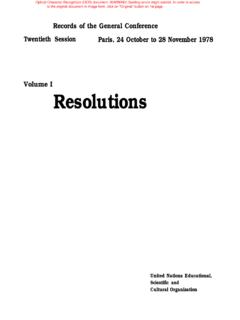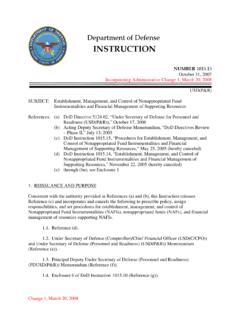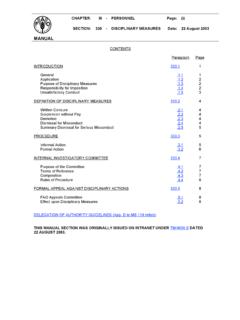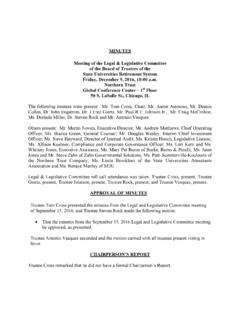Transcription of OECD-US Treasury International Conference OECD …
1 Washington, DC, USAMay 7-8, 2008 VOLUME I - Keynote addresses, interventionsand main policy Treasury DepartmentOECD-US Treasury International Conference on Financial Education Taking Financial Literacy to the Next Level: Important Challenges and Promising SolutionsOECD-US Treasury International Conference on Financial Education PROCEEDINGSIn order to further advance the policy dialogue on financial education, the OECD and the US Treasury co-organised a high-level International Conference on Financial Education, on 7-8 May 2008, in Washington This successful and particularly well attended global event, and the resulting publications, are an integral part of the OECD Project on Financial first volume of the proceedings provides a selection of main speeches delivered and papers presented at the Conference .
2 The rich analysis in these papers, and the sharing of experience and good practices of senior governmental and private experts makes this publication a valuable reference I - Keynote addresses, interventionsand main policy recommendationsVOLUME I1 OECD-US Treasury International Conference ON FINANCIAL EDUCATION Taking Financial Literacy to the Next Level: Important Challenges and Promising Solutions Washington 7-8 May 2008 PROCEEDINGS VOLUME I Keynote Addresses, Interventions and Main Policy Recommendations 3 FOREWORD On May 7-8, 2008, the Treasury Department and the Organization for Economic Co-operation and Development (OECD) co-organized a two-day high-level International Conference on Financial Education in Washington, DC.
3 It generated a multinational dialogue on recent developments, innovative methods, and successful tactics for improving financial literacy. The culmination of this Conference was the result of OECD s ongoing financial education project which started in 2003 and was built on three main pillars: the elaboration of analytical and comparative research reports; the development of International principles and good practices; and the promotion of enhanced International awareness, cooperation and policy dialogue on financial education1. Through this partnership between the Treasury Department and OECD, the Treasury Department accomplished one of its calls to action outlined in its national strategy entitled, Taking Ownership of the Future: The National Strategy for Financial Literacy2, which was issued in 2006 by the 20-agency Financial Literacy and Education Commission.
4 Participants included over 200 leaders from governments, universities, businesses, non-profits and International organizations that, in total, represented 43 countries. Through a far-reaching programme, these International high-level policy and decision makers and practitioners shared their approaches, experiences and best practices on most topical and challenging financial education issues including: Creating and implementing national financial education strategies New realities of retirement savings Enhancing awareness of risks transferred to individuals Credit challenges and opportunities resulting from the mortgage problems Developing and delivering youth financial literacy programs Increasing financial access for underserved groups Identifying efficient practical tools and innovative techniques to implement financial education programs In his opening address at the Conference , the OECD Deputy Secretary-General, Mr.
5 Pier Carlo Padoan stressed that Financial education is not just for investors. It is just as important, if not more so, for the average family trying to balance its budget and save for their children s education and the parents retirement. He touched upon upcoming challenges for financial education and concluded by noting that financial education should be considered as a complement to, rather than a substitute for, proper financial market regulation and supervision. 1 For further information, on this project, see the foreword of volume II and the OECD International Gateway for Financial Education ( ) 2 For more information about the National Strategy, see 4 The Secretary of the Treasury Department Henry M.
6 Paulson, Jr. in closing the Conference stated that as the world has become more connected and financial products have become more complex, there is an even greater need for financial education. He also said people everywhere want to know how to wisely spend, save and invest their money. They want to build a more secure and prosperous future for themselves and for their families. Among the keynote speakers and moderators of the Conference , Dan Iannicola, Jr., Treasury Deputy Assistant Secretary for Financial Education and Executive Director of the President's Advisory Council on Financial Literacy, emphasized that in spite of nations unique economic characteristics, they share a number of common problems when their populations lack needed financial skills.
7 He said a goal of the Conference was to bring countries together to look for common solutions to these problems. Andr Laboul, head of OECD's Financial Affairs Division, also stressed the need to develop a new culture of financial responsibility and help citizens become financially educated. He said that in a world where financial risks are increasingly transferred to households, financial education has become an essential policy tool. This volume provides the details of the Conference sessions and panel including the main keynote addresses and summary of interventions of speakers as well as specific policy conclusions of moderators for each session3. The OECD and the Treasury Department would like to especially thank the Organization of American States and its staff for hosting the event.
8 They are also grateful to all the speakers and moderators for their valuable contributions to the success of this Conference . The views expressed here are the sole responsibility of their authors and do not necessarily reflect those of the OECD Committee on Financial Markets, Insurance and Private Pensions Committee and Working Party on Private Pensions, the Secretariat, the Member or non-Member countries. The publication has been prepared by the OECD Financial Affairs Division with the collaboration of the Treasury Department s Office of Financial Education. Dan Iannicola Andr Laboul Treasury Deputy Assistant Secretary Head of the Financial Affairs Division for Financial Education and OECD Executive Director of the President's Advisory Council on Financial Literacy 3 PowerPoint presentations and papers included in this publication as well as bios of moderators and speakers are available on the OECD Conference webpage The Conference was transmitted live by the OAS, with the support of the Young Americas Business Trust, and can be viewed through their videos on demand service at 5 6 TABLE OF CONTENTS FOREWORD.
9 3 OPENING ADDRESS, IMPORTANCE OF FINANCIAL EDUCATION Pier Carlo Padoan, Deputy Secretary-General of the OECD .. 9 SESSION I- NATIONAL STRATEGIES: CREATION AND IMPLEMENTATION .. 13 Chair: Andr Laboul, Head of Financial Affairs Division, OECD .. A- Chris Pond, Director of Financial Capability, FSA, United Kingdom .. 14 B- Paul Clitheroe, Chairman, Financial Literacy Foundation Advisory Board .. 16 C- Diana Crossan, Retirement Commisson, New Zealand .. 27 D- Dan Iannicola, Jr., Treasury Deputy Assistant Secretary for Financial Education and Executive Director of the President's Advisory Council on Financial Literacy, United States .. 30 SESSION II- DIVERSE APPROACHES .. 35 Chair: Ursula Menke, Commissioner, Financial Consumer Agency of Canada, Canada A- Jeanne Hogarth, Manager for the Consumer Education and Research Section, Division of Consumer and Community Affairs, Federal Reserve Board, United States.
10 38 B- Annamaria Lusardi, Professor, Dartmouth College/Harvard Business School, United States .. 41 C- Alison O Connell, OECD Consultant on Methodology to Evaluate Financial Education Programs, New Zealand .. 48 GUEST SPEAKER Martin J. Gruenberg, Vice Chairman, Federal Deposit Insurance Corporation and Chair of the Executive Council and President of the International Association of Deposit Insurers .. 49 SESSION III- RETIREMENT SAVINGS: NEW REALITIES FOR CONSUMERS .. 53 Chair: Mr. D. Swarup, Chairman, Pension Fund Regulatory and Development Authority, India A- Nicolas Blancher, Deputy Division Chief, Monetary and Capital Markets Department, IMF .. 57 B- Ambrogio Rinaldi, Chair, OECD Working Party on Private Pensions, Central Director, COVIP, Italy.

















